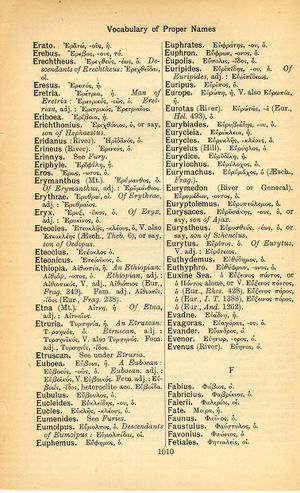Eupolis: Difference between revisions
ξυνῆλθεν ἀτταγᾶς τε καὶ νουμήνιος → birds of a feather flock together, the francolin and the new-moon bird get together
m (Text replacement - "link={{" to "link={{") |
m (Text replacement - "(|thumb)\n(\|link=)" to "$1$2") |
||
| Line 1: | Line 1: | ||
{{WoodhouseENELnames | {{WoodhouseENELnames | ||
|Text=[[File:woodhouse_1010.jpg|thumb | |Text=[[File:woodhouse_1010.jpg|thumb|link={{filepath:woodhouse_1010.jpg}}]]Εὔπολις, -ιδος, ὁ. | ||
|link={{filepath:woodhouse_1010.jpg}}]]Εὔπολις, -ιδος, ὁ. | |||
}} | }} | ||
{{Lewis | {{Lewis | ||
Revision as of 16:47, 18 May 2020
English > Greek (Woodhouse)
Εὔπολις, -ιδος, ὁ.
Latin > English (Lewis & Short)
Eupŏlis: ĭdis, m., = Εὔπολις,
I a celebrated comic poet in Athens, contemporary with Aristophanes, Hor. S. 1, 4, 1; Vell. 1, 16; Quint. 1, 10, 18; 10, 1, 66; 12, 10, 65 al.; acc. Eupolin, Hor. S. 2, 3, 12: Eupolidem, Pers. 1, 124; Cic. Brut. 9, 15.
Latin > French (Gaffiot 2016)
Eupŏlis,¹⁴ ĭdis, m. (Εὔπολις), poète grec de l’ancienne comédie : Cic. Br. 38 ; Hor. S. 1, 4, 1. acc. -in Hor. S. 2, 3, 12 ; -idem Pers. 1, 124.
Latin > German (Georges)
Eupolis, polidis, Akk. polin, selten polidem, Abl. polī u. polide, m. (Εὔπολις), ein alter griech. Komödiendichter zu Athen, Zeitgenosse des Aristophanes, Cic. Brut. 38. Cic. ad Att. 12, 6, 3 (Abl. Eupoli). Hor. sat. 1, 4, 1; 2, 3, 12 (Akk. Eupolin). Vell. 1, 16, 4. Quint. 10, 1, 66. Pers. 1, 124 (Akk. Eupolidem).

